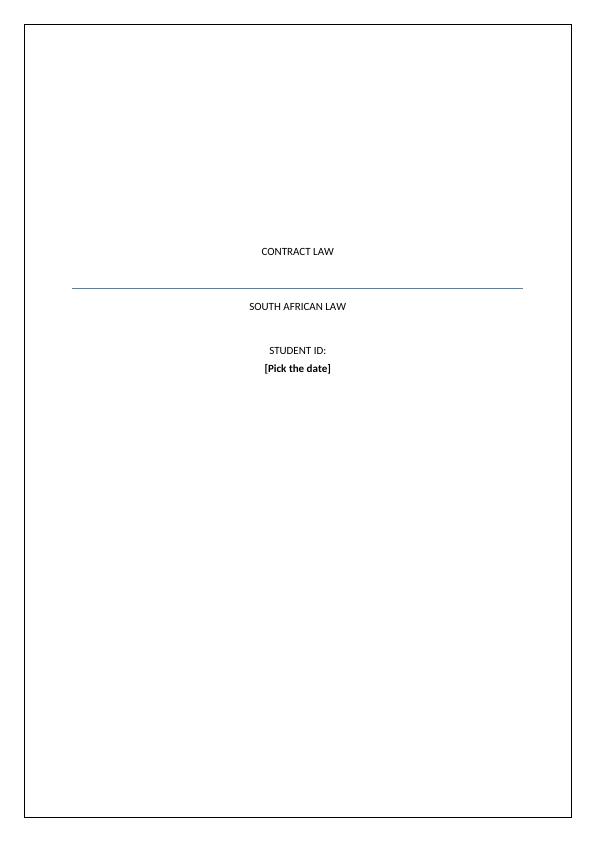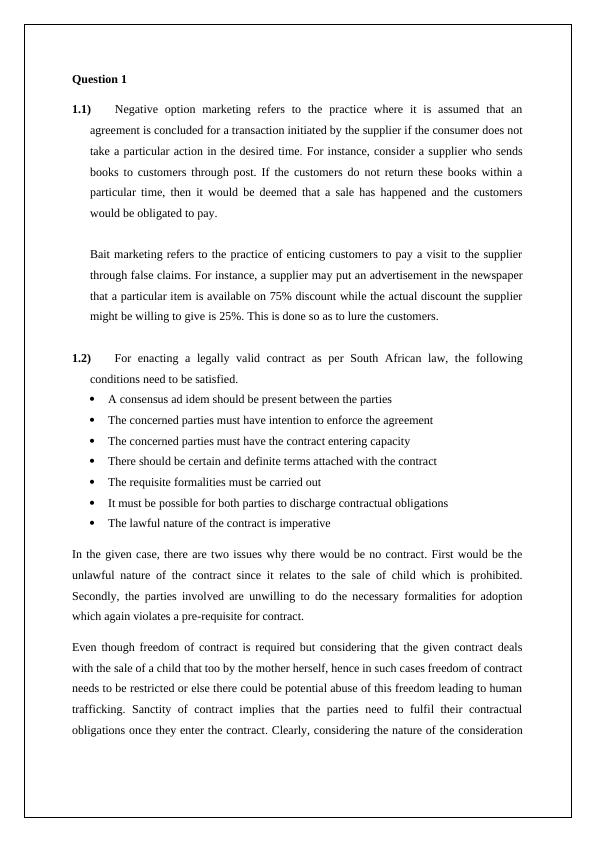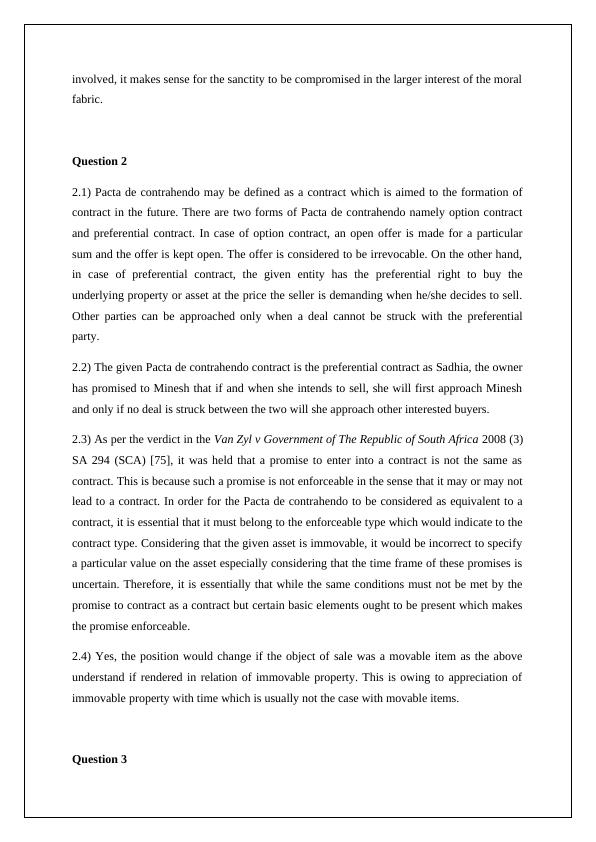Contract Law in South African Law: Analysis of Various Legal Aspects
6 Pages1779 Words201 Views
Added on 2023-06-12
About This Document
This article discusses various legal aspects of contract law in South African law, including negative option marketing, Pacta de contrahendo, and duress. It also provides advice on legal enforceability of contracts entered under duress and delictual damages.
Contract Law in South African Law: Analysis of Various Legal Aspects
Added on 2023-06-12
ShareRelated Documents
CONTRACT LAW
SOUTH AFRICAN LAW
STUDENT ID:
[Pick the date]
SOUTH AFRICAN LAW
STUDENT ID:
[Pick the date]

Question 1
1.1) Negative option marketing refers to the practice where it is assumed that an
agreement is concluded for a transaction initiated by the supplier if the consumer does not
take a particular action in the desired time. For instance, consider a supplier who sends
books to customers through post. If the customers do not return these books within a
particular time, then it would be deemed that a sale has happened and the customers
would be obligated to pay.
Bait marketing refers to the practice of enticing customers to pay a visit to the supplier
through false claims. For instance, a supplier may put an advertisement in the newspaper
that a particular item is available on 75% discount while the actual discount the supplier
might be willing to give is 25%. This is done so as to lure the customers.
1.2) For enacting a legally valid contract as per South African law, the following
conditions need to be satisfied.
A consensus ad idem should be present between the parties
The concerned parties must have intention to enforce the agreement
The concerned parties must have the contract entering capacity
There should be certain and definite terms attached with the contract
The requisite formalities must be carried out
It must be possible for both parties to discharge contractual obligations
The lawful nature of the contract is imperative
In the given case, there are two issues why there would be no contract. First would be the
unlawful nature of the contract since it relates to the sale of child which is prohibited.
Secondly, the parties involved are unwilling to do the necessary formalities for adoption
which again violates a pre-requisite for contract.
Even though freedom of contract is required but considering that the given contract deals
with the sale of a child that too by the mother herself, hence in such cases freedom of contract
needs to be restricted or else there could be potential abuse of this freedom leading to human
trafficking. Sanctity of contract implies that the parties need to fulfil their contractual
obligations once they enter the contract. Clearly, considering the nature of the consideration
1.1) Negative option marketing refers to the practice where it is assumed that an
agreement is concluded for a transaction initiated by the supplier if the consumer does not
take a particular action in the desired time. For instance, consider a supplier who sends
books to customers through post. If the customers do not return these books within a
particular time, then it would be deemed that a sale has happened and the customers
would be obligated to pay.
Bait marketing refers to the practice of enticing customers to pay a visit to the supplier
through false claims. For instance, a supplier may put an advertisement in the newspaper
that a particular item is available on 75% discount while the actual discount the supplier
might be willing to give is 25%. This is done so as to lure the customers.
1.2) For enacting a legally valid contract as per South African law, the following
conditions need to be satisfied.
A consensus ad idem should be present between the parties
The concerned parties must have intention to enforce the agreement
The concerned parties must have the contract entering capacity
There should be certain and definite terms attached with the contract
The requisite formalities must be carried out
It must be possible for both parties to discharge contractual obligations
The lawful nature of the contract is imperative
In the given case, there are two issues why there would be no contract. First would be the
unlawful nature of the contract since it relates to the sale of child which is prohibited.
Secondly, the parties involved are unwilling to do the necessary formalities for adoption
which again violates a pre-requisite for contract.
Even though freedom of contract is required but considering that the given contract deals
with the sale of a child that too by the mother herself, hence in such cases freedom of contract
needs to be restricted or else there could be potential abuse of this freedom leading to human
trafficking. Sanctity of contract implies that the parties need to fulfil their contractual
obligations once they enter the contract. Clearly, considering the nature of the consideration

involved, it makes sense for the sanctity to be compromised in the larger interest of the moral
fabric.
Question 2
2.1) Pacta de contrahendo may be defined as a contract which is aimed to the formation of
contract in the future. There are two forms of Pacta de contrahendo namely option contract
and preferential contract. In case of option contract, an open offer is made for a particular
sum and the offer is kept open. The offer is considered to be irrevocable. On the other hand,
in case of preferential contract, the given entity has the preferential right to buy the
underlying property or asset at the price the seller is demanding when he/she decides to sell.
Other parties can be approached only when a deal cannot be struck with the preferential
party.
2.2) The given Pacta de contrahendo contract is the preferential contract as Sadhia, the owner
has promised to Minesh that if and when she intends to sell, she will first approach Minesh
and only if no deal is struck between the two will she approach other interested buyers.
2.3) As per the verdict in the Van Zyl v Government of The Republic of South Africa 2008 (3)
SA 294 (SCA) [75], it was held that a promise to enter into a contract is not the same as
contract. This is because such a promise is not enforceable in the sense that it may or may not
lead to a contract. In order for the Pacta de contrahendo to be considered as equivalent to a
contract, it is essential that it must belong to the enforceable type which would indicate to the
contract type. Considering that the given asset is immovable, it would be incorrect to specify
a particular value on the asset especially considering that the time frame of these promises is
uncertain. Therefore, it is essentially that while the same conditions must not be met by the
promise to contract as a contract but certain basic elements ought to be present which makes
the promise enforceable.
2.4) Yes, the position would change if the object of sale was a movable item as the above
understand if rendered in relation of immovable property. This is owing to appreciation of
immovable property with time which is usually not the case with movable items.
Question 3
fabric.
Question 2
2.1) Pacta de contrahendo may be defined as a contract which is aimed to the formation of
contract in the future. There are two forms of Pacta de contrahendo namely option contract
and preferential contract. In case of option contract, an open offer is made for a particular
sum and the offer is kept open. The offer is considered to be irrevocable. On the other hand,
in case of preferential contract, the given entity has the preferential right to buy the
underlying property or asset at the price the seller is demanding when he/she decides to sell.
Other parties can be approached only when a deal cannot be struck with the preferential
party.
2.2) The given Pacta de contrahendo contract is the preferential contract as Sadhia, the owner
has promised to Minesh that if and when she intends to sell, she will first approach Minesh
and only if no deal is struck between the two will she approach other interested buyers.
2.3) As per the verdict in the Van Zyl v Government of The Republic of South Africa 2008 (3)
SA 294 (SCA) [75], it was held that a promise to enter into a contract is not the same as
contract. This is because such a promise is not enforceable in the sense that it may or may not
lead to a contract. In order for the Pacta de contrahendo to be considered as equivalent to a
contract, it is essential that it must belong to the enforceable type which would indicate to the
contract type. Considering that the given asset is immovable, it would be incorrect to specify
a particular value on the asset especially considering that the time frame of these promises is
uncertain. Therefore, it is essentially that while the same conditions must not be met by the
promise to contract as a contract but certain basic elements ought to be present which makes
the promise enforceable.
2.4) Yes, the position would change if the object of sale was a movable item as the above
understand if rendered in relation of immovable property. This is owing to appreciation of
immovable property with time which is usually not the case with movable items.
Question 3

End of preview
Want to access all the pages? Upload your documents or become a member.
Related Documents
Business Law Assignmentlg...
|4
|822
|452
